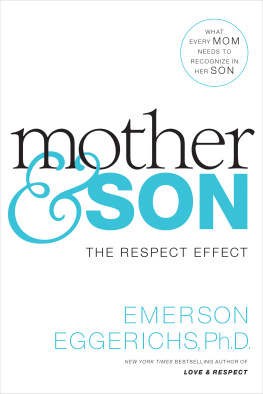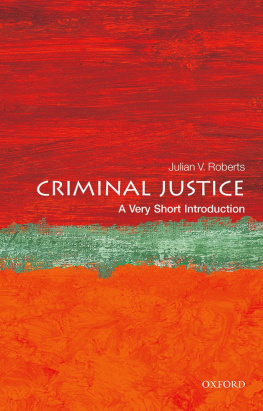RESPECT AND CRIMINAL JUSTICE
CLARENDON STUDIES IN CRIMINOLOGY
Published under the auspices of the Institute of Criminology, University of Cambridge; the Mannheim Centre for the Study of Criminology and Criminal Justice, London School of Economics, and the Centre for Criminology, University of Oxford.
General Editors: Loraine Gelsthorpe and Kyle Treiber
(University of Cambridge)
Editors:Alison Liebling
(University of Cambridge)
Tim Newburn, Jill Peay, Coretta Phillips, andPeter Ramsay
(London School of Economics)
Mary Bosworth, Carolyn Hoyle, Ian Loader, andLucia Zedner
(University of Oxford)
RECENT TITLES IN THIS SERIES:
Respectable Citizens - Shady Practices: The Economic Morality of the Middle Classes
Farrall and Karstedt
Advocates of Humanity: Human Rights NGOs in International Criminal Justice
Lohne
Intimate Crimes: Kidnapping, Gangs, and Trust in Mexico City
Ochoa
Police Community Support Officers: Cultures and Identities within Pluralised Policing
ONeill
Last Chance for Life: Clemency in Southeast Asian Death Penalty Cases
Pascoe
Police Unlimited: Policing, Migrants, and the Values of Bureaucracy
Mutsaers
Personalizing the State: An Anthropology of Law, Politics, and Welfare in Austerity Britain
Koch

Great Clarendon Street, Oxford, OX2 6DP,
United Kingdom
Oxford University Press is a department of the University of Oxford. It furthers the Universitys objective of excellence in research, scholarship, and education by publishing worldwide. Oxford is a registered trade mark of Oxford University Press in the UK and in certain other countries
Gabrielle Watson 2020
The moral rights of the author have been asserted
First Edition published in 2020
Impression: 1
All rights reserved. No part of this publication may be reproduced, stored in a retrieval system, or transmitted, in any form or by any means, without the prior permission in writing of Oxford University Press, or as expressly permitted by law, by licence or under terms agreed with the appropriate reprographics rights organization. Enquiries concerning reproduction outside the scope of the above should be sent to the Rights Department, Oxford University Press, at the address above
You must not circulate this work in any other form and you must impose this same condition on any acquirer
Crown copyright material is reproduced under Class Licence Number C01P0000148 with the permission of OPSI and the Queens Printer for Scotland
Published in the United States of America by Oxford University Press
198 Madison Avenue, New York, NY 10016, United States of America
British Library Cataloguing in Publication Data
Data available
Library of Congress Control Number: 2019946531
ISBN 9780198833345
eISBN 9780192569806
Links to third party websites are provided by Oxford in good faith and for information only. Oxford disclaims any responsibility for the materials contained in any third party website referenced in this work.
General Editors Introduction
The Clarendon Studies in Criminology series aims to provide a forum for outstanding theoretical and empirical work in all aspects of criminology and criminal justice, broadly understood. The Editors welcome submissions from established scholars, as well as excellent PhD work. The Series was inaugurated in 1994, with Roger Hood as its first General Editor, following discussions between Oxford University Press and Oxfords Centre for Criminological Research. It is now edited under the auspices of three centres: the Institute of Criminology at the University of Cambridge, the Mannheim Centre for the Study of Criminology and Criminal Justice at the London School of Economics, and the Centre for Criminology at the University of Oxford. Each supplies members of the Editorial Board and, in turn, the Series General Editor or Editors.
This book is refreshing in its outlook and approach to the concept of respect in criminal justice. Drawing on insights from philosophical and social scientific perspectives, Gabrielle Watson offers a deep exploration of respect in the criminal justice context. As the author indicates, the book was prompted by a sense of curiosity as to why criminal justice agencies seemingly overlook or devalue a moral value as fundamental as respect. The focus on policing and imprisonment within the middle chapters of the book point to a respect deficit and illuminate the different ways in which criminal justice practices are limited. The book also amounts to a strong critique of narrow instrumentalism that dominates some current approaches to criminal justice policy. The author also draws attention to some of the limitations of procedural justice without proper recourse to a normative and intrinsic view of respect. The lucid arguments in the book thus take us further than discussions of dignity and decency, which have become rather commonplace terms in criminal justice discourse and somewhat empty official words and administrative practices. Indeed, the book makes a normative contribution to debate: it is about values and what matters, and how to create and sustain policing and imprisonment practices that are characterised rather than merely constrained by respect. The concluding chapter addresses the issue of how best to embed respect in criminal justice practice, not in a utopian way, but in a modest and realistic way that makes it all seem possible. It is heartening to see the optimism and principled arguments within the book. We are writing this in the context of news from the current Prime Minister that sentencing is to get tougher and prison regimes harsher. This is somewhat removed from evidence-based policy that scholarship calls for, and at a distance from the authors insightful analysis which concludes that respect in policing and in prisons can ultimately serve legitimacy and effective practice.
As General Editors, we recommend this book. It makes a significant contribution to the field of criminal justice. We have no doubt that this will become an indispensable reference for academics, and we hope that managers in various criminal justice contexts will read it too. The book also deserves wide readership amongst policymakers. We are enthusiastic in welcoming Respect and Criminal Justice to the Clarendon Studies in Criminology series.
Loraine Gelsthorpe and Kyle Treiber
Institute of Criminology, University of Cambridge
September 2019
Acknowledgements
In preparing this book for publication, I have incurred more debts of gratitude than I can reasonably acknowledge here. Nonetheless, I would like to extend my sincere thanks to those who have supported me with exceptional generosity.
First and foremost, I am deeply indebted to my academic mentors, Ian Loader and Lucia Zedner. They have held my work to exacting standards and offered the kind of written feedback on the manuscriptincisive, demanding, constructive, and thoughtfulone dreams of receiving. I am especially grateful to Ian for his encouragement when a book on respect was little more than a tentativeand overly ambitiousidea, and to Lucia for her unparalleled support as I encountered the academic publication process for the first time.













